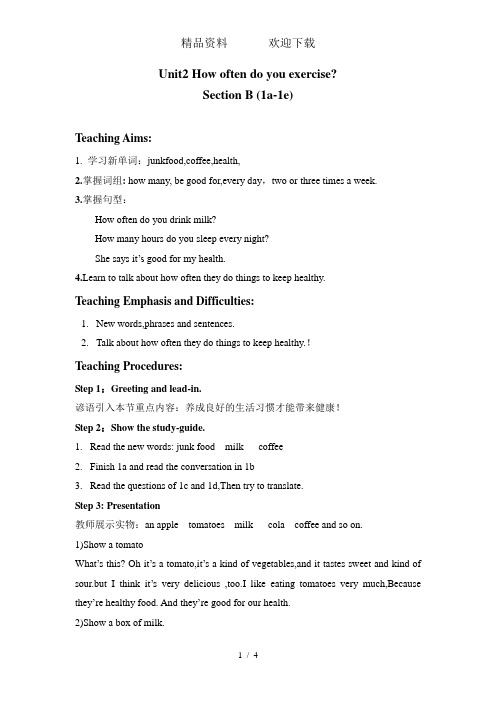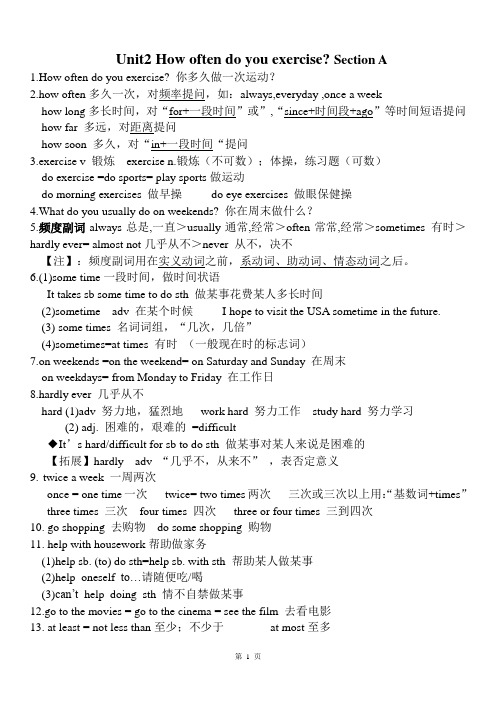人教版新目标八年级英语上册U2How often do you exercise导学案(无答案)-精选文档
- 格式:doc
- 大小:51.00 KB
- 文档页数:4

Unit 2 How often do you exercise?单元教材分析的活动的习气和认识。
情感态度1.指点同学养成良好的活动和作息习气,合理安排各项活动,如周末活动(学习、劳动、文娱、熬炼等);2.培养同学良好的生活习气,如饮食习气、帮助父母干家务的习气等。
文明认识1.了解不同的人物的活动安排的特点,培养本人健康的生活方式;2.学会更合理地安排本人的课外活动。
课时教学设计第一课时Section A (1a-2d)1.通过看图说话、师生问答、听录音、角色扮演等方式,掌握本课时的housework,Internet,program,full,swing这几个词汇和hardly,ever,hardly ever,once,twice这几个频度副词和短语。
2.通过师生问答、角色扮演、调查采访、做游戏等方式,学会“How often…?”“I usually…”等句子结构,并能用之谈论、描述本人或他人的专业活动,同其他人沟通与专业活动有关的信息,谈论本人或他人进行某项活动的频率。
重点使同学掌握与专业活动相关的英语词汇及本课时的句型“What do you usually do on weekends?”“I always exercise.”“How often do you…?”“I…once a week.”让同学了解世界上其他国家人们的专业活动情况。
难点让同学运用所学言语项目How often do you…?谈论本人或他人的专业活动及其频率。
Step 1 情景导入通过师生自在交际进行复习与热身。
让同学回忆关于专业活动的词汇,例如watch TV, read books,exercise, go shopping,go to the movies 等。
通过师生谈论本人的专业活动,调动同学对本课话题的学习爱好,同时实现新旧知识的衔接,巩固已学知识,并引出本节课的学习话题。
For example:T:What do you usually do on weekends?S1:I usually help with housework.S2:I usually play basketball with my friends.S3:I usually go shopping.T:Do you usually go shopping on weekends?S1:Yes,I do.T:So do I.S2:OK.After class we'll go shopping.T:Do you usually watch TV on weekends?S3:No,I don't. I usually read a book.…(设计意图:本环节通过回忆之前学过的词汇进行课前热身,让同学打开记忆的大门,快速激活已有的知识库存,为下一环节的学习奠定基础。

人教版英语八年级上册Unit 2《How often do you exerciseol》教学设计一. 教材分析人教版英语八年级上册Unit 2《How often do you exercise》主要讲述了关于频率疑问词how often的用法,以及一般现在时的表达方式。
通过本节课的学习,学生能够掌握频率疑问词how often,并能用一般现在时表达自己的生活习惯。
教材中包含了丰富的语言实践活动,如听力、口语、阅读和写作,有助于学生全面提高英语水平。
二. 学情分析八年级的学生已经具备了一定的英语基础,能够听懂并运用一般现在时。
但部分学生对频率疑问词how often的用法还不够熟练,因此在教学中需要重点强调。
此外,学生对生活话题的讨论感兴趣,有利于激发学习积极性。
三. 教学目标1.知识目标:–能够正确使用频率疑问词how often。
–能够用一般现在时表达自己的生活习惯。
2.能力目标:–提高学生的听说读写能力,熟练运用本节课所学知识进行交流。
3.情感目标:–培养学生热爱生活、注重锻炼的良好习惯。
四. 教学重难点•频率疑问词how often的用法。
•一般现在时的表达方式。
•正确运用频率疑问词how often进行提问和回答。
•如何运用一般现在时表达自己的生活习惯。
五. 教学方法1.情境教学法:通过设定生活场景,让学生在实际语境中练习英语。
2.交际教学法:鼓励学生积极参与课堂互动,提高口语表达能力。
3.任务型教学法:通过完成小组任务,培养学生的合作精神和团队意识。
4.反馈评价法:及时给予学生反馈,鼓励学生自主发现问题并改正。
六. 教学准备1.教材:人教版英语八年级上册。
2.课件:制作与本节课相关的内容,包括图片、视频等。
3.练习题:针对本节课的内容,设计听、说、读、写等方面的练习。
4.教学设备:投影仪、音响等。
七. 教学过程1.导入(5分钟)–教师通过提问学生日常生活中喜欢的事物,引出本节课的主题——生活习惯。

Unit2 How often do you exercise?Section B (1a-1e)Teaching Aims:1. 学习新单词:junkfood,coffee,health,2.掌握词组: how many, be good for,every day,two or three times a week.3.掌握句型:How often do you drink milk?How many hours do you sleep every night?She says i t’s good for my health.4.Learn to talk about how often they do things to keep healthy.Teaching Emphasis and Difficulties:1.New words,phrases and sentences.2.Talk about how often they do things to keep healthy.!Teaching Procedures:Step 1:Greeting and lead-in.谚语引入本节重点内容:养成良好的生活习惯才能带来健康!Step 2:Show the study-guide.1.Read the new words: junk food milk coffee2.Finish 1a and read the conversation in 1b3.Read the questions of 1c and 1d,Then try to translate.Step 3: Presentation教师展示实物:an apple tomatoes milk cola coffee and so on.1)Show a tomatoWhat’s this? Oh it’s a tomato,it’s a kind of vegetables,and it tastes sweet and kind of sour.but I think it’s very delicious ,too.I like eating tomatoes very much,Because they’re healthy food. And they’re good for our health.2)Show a box of milk..Do you like milk? Do you drink milk every day? Why /Why not?4)Show a glass of colaDo you like drinding cola?Yes,I do. I like it very much. It’s very delicious.Is it healthy food? No,it isn’t, It’s junk food,Do’t drink it too often!教师补充:I think most of you like drinking cola,I love it too, But you should drink less cola,Because it’s junk food,It’s bad for our health.Do you know what “junk food”mean?图片展示“junk food”5)Show a picture of coffee学习单词:”coffee”Have you ever drunk coffee? I don’t think it’s very delicious ,Because it’s a little bitter(苦).So I usually put some suger in it when I drink coffee,But some of the people like drinking coffee ,because it can give them energy. If they work too late at night,They usually drink some coffee,and they can go on working.Then show some pictures ,and let the Ss tell they are healthy food or junk food. What should we do to keep healthy?Step 4: Finish 1a and check the answers.Step 5: Pair workI want to know what eating habits you have ,so answer some of my questions! T:How often do you eat…?drink…?S :I eat/drink… every day/….T:Do you like it ?S:Yes,I do.It’s good for my health./No,I don’t.But my mother wants me to eat/drink it.Step5 :Listening:Work on 1c:Now ,we have known what our eating habits are ,do you want to know what habits Tina and Bill have?Now let’s begin our listening, a reporter is interviewing Bill and Tina what their eating habits are. Listen to the recordingand find the answer to these two questions: Does Tina have good habits? Does Bill have good habits? Listen and find the answers to the questions.3. T: Now let's work on 1d. First, let one student read the sentences and try to know the meaning of the sentences.4. Play the first time, Ss just listen. Play the tape for the second time for the Ss to listen and find the answers.5. Check the answers:Step 6:Do a survey.营养学专家李博士想了解我们中学生的饮食习惯.下面是一个小测试.你能够完成吗?A.good(16-20)B.OK (8-15)C. bad(8分以下)My eating habits are_______.Step 7:Pair work1. Work in pairs. Ask and answer questions. SA is the reporter. SB is Tina or Bill. Ask and answer questions.and write down the result.like this;e.g. ─How often do you eat vegetables?─I eat vegetables every day.─And how often do you eat fruit…?─I eat furit…2. Teacher can walk around the classroom, and give some help to the Ss.Step 8:Discussion.Work in groups, Then discuss who has good habitsStep9:Do a report according the discussion like this:I think I have good habits,I often eat fruit and drink milk,and I never drink cola……..I think my friend *** has good habits. He exercises every day,and he often eats fruit and vegetables……小组进行展示,表现好的予以奖励!Step10:升华提高As a student,we must have good habits,,How can we have good habits?we should have three meals every day and eat more fruit and vegetable.We should also eat less junk food ,We should often exercise and sleep nine hours every night.Sometimes we can watch TV but we should not watch too much,It’s bad for our eyes,we should use the interner,but remember we ‘d better not play computer games,It’s not good for you!Healthy habit can help us get good grades. Good food and exercise help us to study better.Finally,let’s end up with an English saying:Early to bed and early to rise makes a man healthy, wealthy and wise.早睡早起身体好。


人教新目标版英语八上Unit 2《How often do you exercise》(Period 4)教学设计一. 教材分析人教新目标版英语八上Unit 2《How often do you exercise》(Period 4)的主要内容是围绕频率副词和一般现在时进行交际。
通过本节课的学习,学生能够掌握频率副词的用法,询问和回答关于日常活动的一般现在时问题。
教材以实际生活场景为背景,让学生在真实语境中学习英语,提高他们的语言运用能力。
二. 学情分析八年级的学生已经掌握了基本的英语语法知识和一定数量的词汇,具备了一定的听、说、读、写能力。
但是,学生在使用英语进行实际交流时,往往会出现表达不准确、语法错误等问题。
因此,在教学过程中,需要关注学生的个体差异,充分调动他们的学习积极性,提高他们的语言运用能力。
三. 教学目标1.知识目标:学生能够掌握频率副词的用法,正确运用一般现在时进行交际。
2.能力目标:学生能够在真实语境中运用英语进行交流,提高他们的语言运用能力。
3.情感目标:培养学生热爱生活、关注健康的意识,使他们养成良好的生活习惯。
四. 教学重难点1.重点:频率副词的用法和一般现在时的交际运用。
2.难点:频率副词在实际语境中的准确运用,以及一般现在时在实际交际中的运用。
五. 教学方法1.情境教学法:通过生活场景的展示,让学生在真实语境中学习英语。
2.交际法:引导学生进行实际交际,提高他们的语言运用能力。
3.任务型教学法:通过完成具体任务,让学生在实践中掌握知识。
六. 教学准备1.教学课件:制作涵盖本节课主要内容的教学课件。
2.教学素材:准备相关的生活场景图片、视频等教学素材。
3.作业布置:提前为学生布置相关的预习作业。
七. 教学过程1.导入(5分钟)利用图片或视频展示一些运动场景,引导学生谈论日常生活中喜欢的运动。
教师提问:“What sports do you like?”,学生回答:“I like playing basketball.”等。

Unit2 How often do you exercise? Section A1.How often do you exercise? 你多久做一次运动?2.how often多久一次,对频率提问,如:always,everyday ,once a weekhow long多长时间,对“for+一段时间”或”,“since+时间段+ago”等时间短语提问how far 多远,对距离提问how soon 多久,对“in+一段时间“提问3.exercise v 锻炼exercise n.锻炼(不可数);体操,练习题(可数)do exercise =do sports= play sports做运动do morning exercises 做早操do eye exercises 做眼保健操4.What do you usually do on weekends? 你在周末做什么?5.频度副词always总是,一直>usually通常,经常>often常常,经常>sometimes 有时>hardly ever= almost not几乎从不>never 从不,决不【注】:频度副词用在实义动词之前,系动词、助动词、情态动词之后。
6.(1)some time一段时间,做时间状语It takes sb some time to do sth 做某事花费某人多长时间(2)sometime adv 在某个时候I hope to visit the USA sometime in the future.(3) some times 名词词组,“几次,几倍”(4)sometimes=at times 有时(一般现在时的标志词)7.on weekends =on the weekend= on Saturday and Sunday 在周末on weekdays= from Monday to Friday 在工作日8.hardly ever 几乎从不hard (1)adv 努力地,猛烈地work hard 努力工作study hard 努力学习(2) adj. 困难的,艰难的=difficult◆It’s hard/difficult for sb to do sth 做某事对某人来说是困难的【拓展】hardly adv “几乎不,从来不”,表否定意义9.twice a week 一周两次once = one time一次twice= two times两次三次或三次以上用:“基数词+times”three times 三次four times 四次three or four times 三到四次10.go shopping 去购物do some shopping 购物11.help with housework帮助做家务(1)help sb. (to) do sth=help sb. with sth 帮助某人做某事(2)help oneself to…请随便吃/喝(3)can’t help doing sth 情不自禁做某事12.go to the movies = go to the cinema = see the film 去看电影13. at least = not less than至少;不少于at most至多14. use the Internet 上网15.What’s your favorite program?=What program do you like best?你最喜欢的节目是什么?16.every day 每天= each day 做状语,放在句末,对其提问用how ofteneveryday = daily adj. 每天的,作定语,修饰名词,放在名词之前He exercises every day. 他每天都锻炼。
人教新目标版英语八上Unit 2《How often do you exercise》(Period 5)教学设计一. 教材分析人教新目标版英语八上Unit 2《How often do you exercise》(Period 5)的主要内容是围绕频率副词进行问答,学会用英语询问别人的锻炼习惯,并能够用恰当的频率副词回答。
本节课的主要目标是让学生掌握频率副词的用法,以及如何用英语询问和描述别人的锻炼习惯。
二. 学情分析学生在学习本节课之前,已经掌握了基本的日常交际用语,能够进行简单的自我介绍和询问他人信息。
但是,对于频率副词的用法以及如何用英语询问和描述别人的锻炼习惯还不够熟练。
因此,在教学过程中,需要注重频率副词的讲解和练习,以及锻炼习惯的描述。
三. 教学目标1.能够听懂、会说、会读频率副词:always, usually, often, sometimes,rarely, never。
2.能够用英语询问别人的锻炼习惯,并能用恰当的频率副词回答。
3.能够描述自己的锻炼习惯,并能够询问他人的锻炼习惯。
四. 教学重难点1.频率副词的用法。
2.如何用英语询问和描述别人的锻炼习惯。
五. 教学方法1.交际法:通过模拟真实场景,让学生在实际语境中学习和使用频率副词和锻炼相关的词汇。
2.任务型教学法:通过完成各种任务,让学生在实践中学习和运用英语。
3.小组合作学习:通过小组讨论和互动,提高学生的参与度和积极性。
六. 教学准备1.教学PPT:包括频率副词的图片、例句、练习题等。
2.练习册:配合PPT进行练习。
3.教学录音机:用于播放听力材料。
4.教学视频:用于播放相关场景的视频。
七. 教学过程1.导入(5分钟)通过播放一段关于人们锻炼的视频,引导学生谈论人们的锻炼习惯。
教师提问:“How often do you exercise?”,让学生用中文回答,同时板书频率副词:always, usually, often, sometimes, rarely, never。
Section A(1a)(1)help sb with sth 帮助某人做某事(1b) hardly ever几乎从不(1c)(2)go shopping 去买东西(3)on weekends 在周末(2a)(4)once a week 一星期一次(5)twice a month 一个月两次(6)go to the movies 去看电影(7)every day 每天(2c)(8)how often 多少次(9)Animal World 动物世界(10)use the Internet上网(2d)(11)be free=be not busy=have time 有空(12) have dance and piano lessons上舞蹈和钢琴课(13)swing dance 摇摆舞(14)play tennis 打乒乓球(3a)(15)stay up late熬夜到很晚(16)go to bed去睡觉(17)eat a healthy breakfast 吃一个健康的早餐(18)at least 至少,不少于,起码(19)go to bed early 早睡觉(20)play sports 做运动Section B(1b)(21)be good for 对….有好处be good at doing sth擅长做某事(1d)(22)junk food 垃圾食品(2a)(23)go camping去野营(2b)(24)in one’s free time 在某人的业余时间里(25)ask sb. about sth. 向某人询问某事(26)not ...at all 一点也不(27) for fun 为了娱乐(28)the answers to the questions 问题的答案(29). by doing.... 通过...(30)最受欢迎的the most popular(31) the best way to do sth.做某事的最好方式(32)such as 例如….像….这样(33) spend time with sb. 和某人一起度过(34)old habits lie hard 旧习难改(3a)1.more than 多于2.less than 少于(3)go to the dentist看牙科医生习惯用法1.help sb. with sth 帮助某人做某事2.How about…? ….怎么样?/ ….好不好?3.want sb. to do sth. 想让某人做某事4.How many + 可数名词复数+ 一般疑问句….有多少…..5.主语+ find+ that 从…发现…6.It’s + adj.+ to do sth. 做某事是….的7.What’s your favorite…..? 你最喜欢的……是什么?8.the best way to do sth. 做某事的最好方式词语辨析:1.go to bed 强调“上床睡觉”的动作及过程,但人不一定睡着。
人教版新目标八年级英语上册U2How often do you exercise导学案第一课时小试身手A.写出下列频率副词(100%) _____________ (80%) _____________ (30-50%) _____________ (20%) _____________ (5%) _____________ (0%) _____________B. 英汉互译去看电影______________ 看电视______________ 锻炼___________ 帮助做家务________________________上网______________ 多久____________________去购物______________ hardly ever ______________每周一次______________ 每月两次______________ 每年三次______________ 在周末______________最喜欢的节目______________ 动物世界______________语法:(一)一般现在时的结构1、当句子表状态说明主语是什么或怎么样时,其句型:主+BE动词(am, is, are)+表语,否定式是在BE动词后加not,疑问句是将BE动词提前到句首(即在主语之前)e.g. The two sisters are from America. 这对孪生姐妹是美国人。
The two sisters are not from America.Are the sisters from America?2、当谓语由实义动词充当,A. 主语不是第三人称单数时,肯定句子结构为:主语+动词原形+其它否定式为:主语+don't+动词原形+其它疑问句为:Do+主语+动词原形+其它?e.g. W e speak Chinese. Do you speak Chinese? They don't speak Chinese.B. 当主语是第三人称单数时:肯定句子结构为主语+动词(词尾加s或es)+其它。
否定式为:主语+doesn't+动词原形+其它。
疑问句式:Does+主语+动词原形+其它?C. 三单变化:1多数在动词后加s 如:play—plays like—likes 等。
2以s,x,sh,ch结尾的动词加es 如:go—goes watch----watches 3以辅音字母加y结尾,把y改i再加es fly—flies(二)一般现在时的用法1. 表示现在的状态Tom lives in Beijing.2.表示经常性或习惯性的动作,常与always, often, sometimes, every day, on weekends, once a month, three times a day,in the morning/ afternoon, / evening, at noon, at night ,on Sunday(s), at seven 等表示频率的副词或时间状语连用。
I go to school at seven every day. He plays soccer on Sundays.3表示主语具备的性格和能力等She likes apples. They speak Japanese.4.表示客观事实或普遍真理。
The sun rises in the east and sets in the west. 太阳从东方升起,从西方落下。
(三)How often 表频率,多久一次,对every day, always, usually, sometimes, often once a week 等表示频率的副词或短语提问。
四、当堂检测、能力提升用所给词的正确形式填空1. W e often___________(play) in the playground.2. He _________(get) up at six o’clock.3.__________you_________(brush) your teeth every morning.4. What______ he usually_______(do) after school?5. Danny ______ (study) English, Chinese, Math, Science and Art at school.6. Mike sometimes __________(go) to the park with his sister.7. At eight at night, she __________(watch) TV with his parents.8. ________ Mike________(read) English every day?9. How many lessons_________ your classmates________(have) on Monday? 10. What time_________ his mother_________(do) the housework?第二课时小试身手A(1)空闲的___________ (2)相当,非常____________ (3)上、、、、课____________(4)什么种类____________ (5)摇摆舞______________(6)不得不做______________(7) 你正在学习何种舞蹈?______________________?B —你多久上一次网?—每天。
—他多久读一次英语书籍?—一月一次。
—你多久帮助做一次家务?—总是。
—我每个周一上一次钢琴课。
—那么,周二呢?—我得和我的朋友们打网球。
—我在周末从不购物。
【课堂探究】1. I go to the movies maybe once a month.maybe 是副词,意为“大概,可能,或许”,一般用于句首。
maybe (adv.) = perhaps 也许,可能。
例如:Maybe he knows the answer. Maybe they’ll go skateboarding.【拓展】maybe 与may be的区别。
May be是情态动词+系动词be原形,意为“可能是…,也许是…,大概是…”。
【针对练习】(maybe/may be)①The baby is crying she is hungry. ②The woman a teacher .2. He plays at least twice a week.at least至少;at most至多例如:There are at least forty students in our class.我们班至少有四十名学生。
【针对练习】①His house is very big. There are ________ five rooms.A. at little B. at most C. at least D. at more②She loves playing tennis, and she plays it ________ twice a week. A. often B. always C. at most D. at leastA.用方框内的单词或短语完成下面的句子(有多余选项)always, every day, often, sometimes, never, hardly ever1. He _________.gets up at six o’clock.2. How ________do you go to the movies?3. It _______________rains here. It’s usually sunny and warm.4. Some of my friends exercise every day and hardly ever eat junk food,but the others eat junk food ____________.5. 1 can’t swim. So I ____________go to the beach to swim. Sometimes I go there with my friends to run.B. 用所给单词适当形式填空1. Daniel and Tommy (be) in Class One.2. W e (not watch) TV on Monday.3. Nick _______(not go) to the zoo on Sunday.4. they (like) the W orld Cup?5. What they often (do) on Saturdays?6. _______ your parents (read) newspapers every day?7. The girl (teach) us English on Sundays.8. She and I (take) a walk together every evening. 第三课时:小试身手1.踢足球2. 喝牛奶3.熬夜4. 吃健康的早餐5. 早睡6.做运动7.最好的朋友8. 放学后9.至少点拨升华探究1:She says it’s good for my health.be good for / be bad for 对…….有好处/坏处例如:Drinking milk is good for your health.喝牛奶对你的健康有益。
【针对练习】①An apple a day is good ______ your health. A. at B. for C. in D. with②Reading English is good for _____ English. A. study B. studies C. studied D. studying探究2:health1)同根词:healthy adj.健康的;healthily adv.健康地2)相关的短语:be in good health身体好;Keep healthy / keep in good health【拓展】unhealthy adj.不健康的;不益于健康的【针对练习】健康胜于财富). So we should keep __________.探究3:But my mother wants me to drink it.1) want “想,想要”后可接名词或代词作宾语。